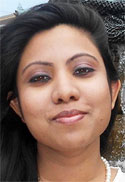
By Debotri Dhar
January 19, 2015
Some scholars, sympathetic to radical Islam, take exception at terming outfits such as Al Qaeda ‘terrorist’.
It was a difficult decision: whether or not to introduce my edited global volume on education and gender with a reference to Pakistan's Malala Yousafzai. On one hand, her co-option by the Western media has come under heavy fire by the Muslim Left and other academics of high standing. On the other hand, who better than the Nobel Prize winning Yousafzai, a teenager who stood up to the bullets of the Taliban, to drive home the passion, power, potency of girls' education in the face of great odds? Perhaps the terrorist attack by the Taliban in Peshawar that left many schoolchildren dead and the more recent killings in Paris validate my eventual decision to honour Yousafzai's educational mission.
The damning distinction in South Asia may be between Hindus and Muslims, at least in some quarters, but it is not always so for expatriates abroad. On immigration issues, a multitude of foreign nationals from the Global South may stand together regardless of religion; on race, they are often joined by hyphenated Americans and other allies. While the post 9/11 Islamophobia resulted in ordinary Muslims — and adult men, in particular — facing the greater brunt of American ire, "random" checks at airports and other security measures also targeted all South Asians: Hindus, Muslims, and turbaned Sikhs who were often mistaken for Afghans.
Poetry, with its notes and nuances, its middle mists, contains more wisdom than partisan politics. Once, waiting in a serpentine queue in Newark's Liberty airport, the elderly Muslim gentleman behind me asked if I was Indian. So was he, a retired professor. "Karen Rukh Nagar Nagar Ka, Ke Surag Koi Payen, Kisi Yaar Namabar Ka, Har Ek Ajnabi Se Poochen, Jo Pata Tha Apne Ghar Ka," he intoned softly. The lines are by the poet Faiz, penned after he had been exiled by the military dictator Zia-ul-Haq, who led Pakistan's Islamisation drive in the 1980s, including enacting the Hudood ordinances. "Humein Yeh Bhi Tha Ganimat, Jo Koi Shumar Hota, Humein Kya Bura Tha Marna, Agar Ek Baar Hota," I completed, to which he chuckled in delight and gifted me his pen. Afterwards, I was deeply moved to see how patient he was with the gum-chewing officer who questioned him at length. Perhaps such magnanimity in the face of mistrust could only have come from an educator. "Khub Tarakki Karna, Ladki," he said affectionately, putting his hand on my head as a blessing when we were parting, reminding me of Parveen Shakir's lines: "Usne Jalti Huyi Peshani Pe Jab Haath Rakha, Rooh Tak Phail Gayee Taseer Masihayi Ki." That is what the world needs, wise and compassionate teachers in and of every religion, so children can have books in their hands, not begging bowls — or worse, guns.
Contrast this with the victim-blaming overdrive we witnessed after the Paris killings. Yes, the cartoons were provocative. We know France is not exactly famous for its Muslim-friendly policies; we know about oil, imperialism, Islamophobia. Which crime does not have a context? But if we don't draw the line at killing, where do we draw it? The head of a Hindu Council in America once told me that Wendy Doniger's interpretations of Hinduism were offensive to minority Hindus here, whose religion was already misunderstood and caricatured by the majority. I disagreed, on grounds of academic and artistic freedom.
Besides, the liberal moments within Hinduism's narrative have always allowed argument and interpretation, I argued. If one defended Doniger's freedom then — and hers was thankfully only a legal battle — and M.F. Husain's freedom before that, how can one not defend Charlie Hebdo now? Some scholars, sympathetic to radical Islam, take exception at the world's terming extremist outfits such as the Al Qaeda "terrorist".
Some even suggest that 9/11 and 26/11 were not terrorist attacks but American and Indian conspiracies respectively. (Foreign climes are particularly conducive for conspiracy theories, but that is plain ludicrous.) Humanity's ultimate bastion of hope collapses when educators use the accommodative indirections of high theory to advocate extremism. We must understand that, after a point, colour ceases to matter: saffron, red, green, all bleed into the death-shroud of white. All sides are dangerously armed. To quote Iqbal: "Watan Ki Fikr Kar Nadan, Musibat Aani Wali Hai."
Source: http://www.sunday-guardian.com/analysis/dont-use-high-theory-to-justify-extremism

No comments:
Post a Comment